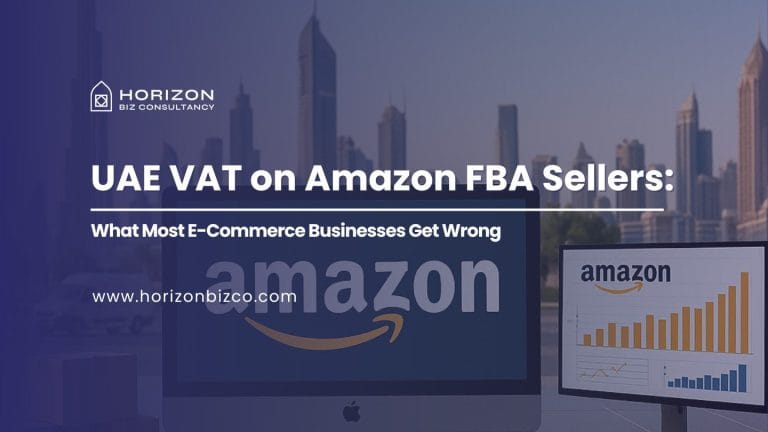The UAE’s e-commerce boom has attracted global sellers to platforms like Amazon.ae. Many believe they can operate remotely, without a local entity, without a UAE office, without VAT. But this belief has landed sellers in trouble with the Federal Tax Authority (FTA).
Let me explain why.
What’s the Setup? You’re an overseas seller:
- You list your products on Amazon.ae.
- You store stock in Amazon’s UAE fulfillment center (FBA).
- Amazon ships your products from the UAE to customers.
- Customer payments are collected locally.
Sounds simple, right?
Here’s the problem: this setup can qualify as a fixed establishment under UAE VAT Law.
Why Is This a Big Deal? According to Article 1 of the UAE VAT Law (Decree-Law No. 8 of 2017), storing goods in a UAE fulfillment center qualifies as a fixed establishment, triggering VAT obligations.
Cabinet Decision No. 52 of 2017 further states that this setup makes the seller a UAE resident for VAT purposes, even without a local trade license.
This means you are carrying out commercial activities within the UAE, and VAT obligations apply, regardless of whether you have a UAE trade license or not.
Here’s What the FTA Considers:
- Your goods are physically stored in the UAE
- Fulfilment and last-mile delivery are managed using the UAE infrastructure
- Revenue is generated through UAE-based commercial activity
- Amazon collects payments and settles funds to you locally
This combination is enough to trigger economic presence, a red flag for VAT compliance.
What This Means for Amazon FBA Sellers If you’re using Amazon FBA in the UAE, you might be:
- Required to register for UAE VAT
- Obligated to file periodic VAT returns
- Liable for backdated VAT payments
- At risk of administrative penalties if you’ve failed to register on time
Often, sellers discover this only after receiving Amazon’s transaction reports months later.
Action Plan: What Should FBA Sellers Do Now?
- Check if your stock is held in the UAE (Amazon fulfillment center)
- Review settlement reports to evaluate your UAE sales activity
- Consult a qualified VAT advisor before assuming you’re exempt
- Register for VAT, file past returns if necessary
- Maintain reconciliation of all UAE-based transactions regularly
Why This Matters More Than Ever: E-commerce sellers, especially those using third-party fulfillment are now firmly under the FTA’s radar. And ignorance of the law won’t protect you from compliance requirements.
Outsourcing to Amazon doesn’t mean you’re invisible to UAE tax laws. It’s time to get proactive.
If you’re unsure whether your e-commerce setup qualifies as a fixed establishment in the UAE, reach out to us at Horizon Biz Consultancy. We specialise in helping e-commerce businesses stay compliant, avoid penalties, and build sustainable operations in the UAE.Need help evaluating your VAT obligations as an Amazon FBA seller?
Contact us and let’s discuss it in detail.
FAQ’S
Yes. If your Amazon FBA setup meets the criteria for fixed establishment, you are considered a UAE resident for VAT purposes even without a local license.
If you’re not using UAE-based fulfillment or storing goods locally, you may not trigger fixed establishment rules, but it’s best to consult a VAT expert to be sure.
Once your documents are ready, it typically takes 5–20 working days, depending on your business model and volume.
Basic requirements include a trade license (if available), proof of transactions (Amazon reports), banking details, and estimated taxable revenue.
Yes. The FTA can impose significant penalties for late registration, missed filings, or incorrect returns. Timely action can reduce these risks.





